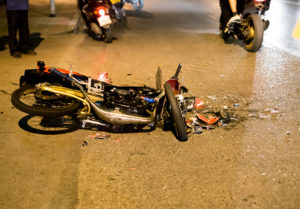
Road conditions that may seem like mere inconveniences for cars can pose life-threatening risks for motorcycles. Even a seemingly small obstacle or an uneven surface can lead to catastrophic consequences, resulting in a rider losing control and suffering a potentially devastating accident.
Motorcyclists are more susceptible to experiencing catastrophic injuries as compared to car drivers because there is nothing solid and sturdy around them to stop them from impact against the rough pavement. This can lead to grave consequences, such as broken bones, road rash, traumatic brain injuries, and even death.
In 2023, 6,335 motorcyclists were killed in traffic crashes, accounting for 15% of all traffic fatalities.This represents a 1.3% increase compared to 2022. Motorcycle fatalities are significantly higher than those of passenger car occupants, with 31.39 motorcyclist fatalities per 100 million vehicle miles traveled, compared to 1.13 for passenger car occupants
Aside from errors made by motorcyclists or vehicle drivers, road hazards are a major cause of these accidents. To avoid them, you need to be vigilant of your surroundings and carefully assess the road and weather conditions. Here are the most common road hazards you should know about that result in motorcycle crashes:
Construction projects, poor maintenance, and roadway resurfacing can leave bumpy, rough patches on the road. Irregularities on the roads can cause the motorcyclist to lose balance, especially at high speed, dramatically increasing the risk of a motorcycle crash. Potholes present a serious hazard for any vehicle, but they can be particularly perilous for motorcyclists. When a front tire strikes a deep pothole, it can send the rider hurtling forward or cause the motorcycle to flip unexpectedly. Similarly, uneven asphalt or poorly patched road repairs can trap a tire, leading to a dramatic and sudden loss of control that can endanger the rider’s life.
Edge breaks refer to a road condition where two traffic lanes have a difference in height. Edge breaks are particularly problematic for bikers who frequently change lanes to maneuver through the traffic, as they may reduce traction and cause them to lose control. Whenever you notice an edge break, it is important to slow down or avoid changing lanes altogether.
Road disrepairs can be especially hazardous to motorcyclists, as they lead to loose gravel and massive potholes. It can be tricky for a bike rider to maneuver through a road with gravel, particularly when cornering. They are bound to slip and fall. Unfortunately, loose gravel is a common problem on winding roads where motorcyclists are required to corner rather frequently. Moreover, sand, broken branches from trees, and other debris reduce traction and often lead to fatal accidents, especially in situations where the bike rider is going too fast and is not skilled or experienced enough to navigate through such road conditions.
The presence of slippery elements—like oil slicks glistening on the asphalt, black ice shimmering in the cold, or pools of standing water—renders motorcycle tires unable to grip the road effectively. Even a thin veil of moisture can drastically elevate the risk of a wipeout, sending a rider tumbling to the ground.
When roadways become overwhelmed with water after heavy rainfall, they can create situations ripe for hydroplaning. Since motorcycle tires possess less surface area compared to car tires, riders are particularly susceptible to losing control in areas where water has collected.
It is crucial for construction zones, lane closures, and detours to be clearly marked with visible warning signs. Inadequate or hard-to-see signage can leave motorcyclists unprepared, limiting their time to react and slow down, which can inevitably lead to accidents.
Hitting a small animal or maneuvering to avoid the collision can throw a motorcycle off balance or off path. It is difficult to anticipate when an animal might start running across the road, and swerving to avoid hitting it can cause an accident. In addition, large animals, such as deer, also pose a major hazard and the impact can be fatal for a motorcyclist.
By being aware of these common road hazards, motorcyclists can actively take steps to protect themselves and enhance their safety on the road. If you have encountered a motorcycle accident due to poor road conditions, seeking counsel from a legal professional may be wise to understand your rights and options
You should mindful about your surroundings and keep your eyes on the road at all times to react immediately to whatever the road may present. If you have been in an accident due to another driver’s negligent actions or poor road conditions, you may be eligible to make a claim against the responsible party. To have your case evaluated by an experienced motorcycle accident attorney, you should contact the Law Offices of Robert T. Edens, P.C. at (847) 395-2200 or online today to schedule your initial consultation.